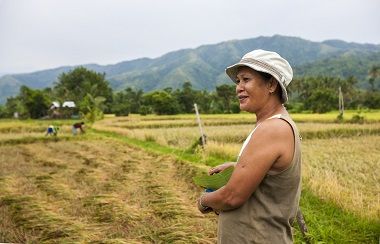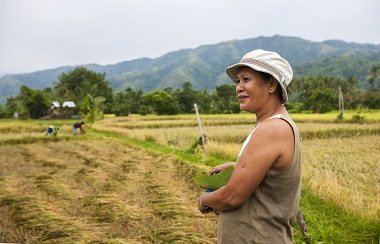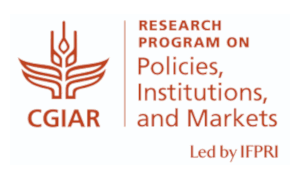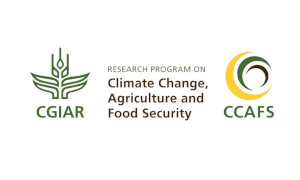Aimed to establish a decision-support mechanism on agricultural, climate change and food security policies, that uses newly generated data, modelling output and innovative scenario assessment. The Addressing the impacts of climate change in the Philippine agriculture sector project is designed to integrate an innovative set of data, models and scenarios in the areas of climate change, agriculture and food security in the Philippine National Economic and Development Authority (NEDA)’s development process (e.g., planning, project evaluation, and investment programming). In the completion of this research project, it is expected that the NEDA technical staffs are capacitated to analyze the strengths and weaknesses of policies and explore the resilience and the provisioning capacity of the agricultural sector given future climate scenarios.
Background
In 2013, IFPRI’s Environment and Production Technology Division (EPTD) began implementation of a research project on “Addressing the Impacts of Climate Change in Philippine Agriculture Sector” in collaboration with NEDA and leading researchers in the Philippines, with financial support from the CGIAR Research Programs on Climate Change, Agriculture, and Food Security (CCAFS) and Policies, Institutions, and Markets (PIM).
The project focused on climate change impacts and policies for climate change adaptation in the Philippine agriculture sector—the sector that is most vulnerable and severely affected by climate change, first, because of its high dependence on natural resources, and second, because it has the highest incidence of poverty and lagging growth compared with the rest of the economy. Project outputs include policy notes and a forthcoming book that is designed to provide a base of knowledge and menu of policy options in support of decisionmaking on agriculture, climate change, and food security. The outputs use synthesis of available knowledge, new analysis, and integrated modeling results to assess adaptation measures under different sets of climate change scenarios to guide decisionmakers in strategic planning and policy formulation.
The analytical framework for the analysis links (1) general circulation models (GCMs) that generate climate change scenarios; (2) biophysical crop modeling; (3) partial equilibrium economic modeling of the agricultural sector incorporating a new Philippines module within IFPRI’s International Model for Policy Analysis of Agricultural Commodities and Trade (IMPACT); and (4) economywide analysis using a dynamic computable general equilibrium model of the Philippines (Phil-DCGE), which was developed under this project. Results from both the synthesis and background analysis and the modeling outputs indicate a magnitude of climate change impacts on the country’s economic growth, poverty incidence, and malnutrition that raise significant concerns and necessitates policy reforms and actions from the governments (national, regional, provincial, and local).
Research adoption and Philippine government actions
In September 2015, NEDA in partnership with IFPRI organized a Policy Research Forum in Manila, Philippines and participated by high-level policymakers of the country. Senator Loren Legarda, head of the Senate’s Committee in Agriculture, expressed her appreciation and recognized the value of such research studies where technical information supports their legislative work. Furthermore, the office of the Senator, which champions efforts in building resiliency against climate change, obtained the policy notes produced from the study and have used these to inform thinking about the impacts of alternative adaptation measures in agriculture.
In 2016, The Department of Budget and Management (DBM) requested NEDA to provide the final results of the study for their reference in project evaluation exercises that help in determining the level of budgetary support as in the case of the Department of Agriculture. NEDA anticipates influencing the reallocation of the national budget through the Budget Priorities Framework spearheaded by DBM, particularly on apportioning higher budget share for the development of high value crops and other important activities such as research and development and extension.
The recommendations of this IFPRI-NEDA study were also utilized to inform the formulation of the strategies to facilitate rapid expansion of opportunities of economic sectors, including agriculture, during the preparation of the Philippine Development Plan 2017-2022. The Agriculture and Fisheries Modernization Program (2018-2023) is being updated and will consider the adaptation strategies identified and analyzed as applicable. The Phil-DCGE results, substantiated by other technical studies, were used by the Philippine Economic Managers (composed of NEDA, Department of Finance, DBM, Department of Trade and Industry) in assessing the decision to extend or renew the Quantitative Restriction (QR).
Moving forward
In May 2018, NEDA requested technical assistance from IFPRI through a new research grant for additional analysis to evaluate the effects of the removal of QR on Philippine rice importation. This new request demonstrates how the recommendations from the earlier research are being considered and further studied for potential adoption of the Philippine government. This project shows that that regular communications and strong linkage with the government are critical in maintaining cooperation and supporting forward actions, particularly in the implementation of recommendations and policies.










